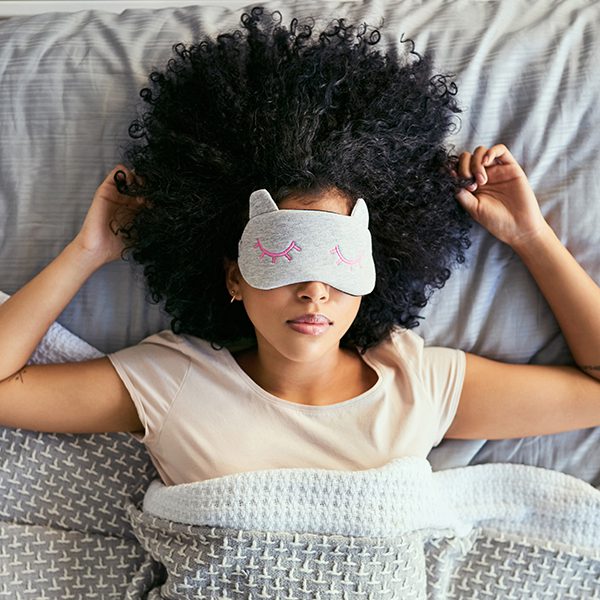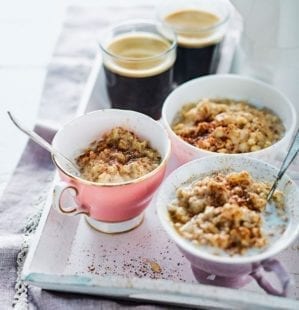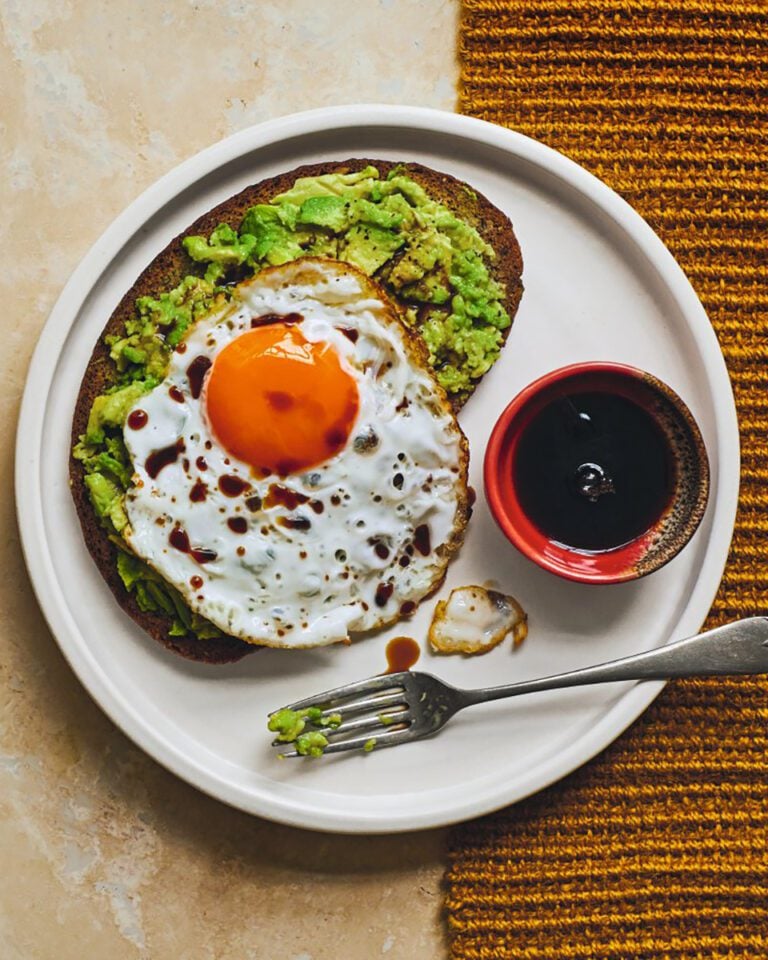Are you a member of the sleep-deprived club?
Experts say there’s clear evidence that food – and when we eat it – can affect the quality of our night-time slumber. Sue Quinn dives under the covers to find out what to eat to help you sleep – and discover surprising tips along the way.

How well do you sleep? Do you regularly struggle to nod off, or wake up and toss and turn, unable to drift back? If so, you’re part of a large sleep-deprived club.
The NHS estimates one in three of us in the UK sleeps poorly, which means millions of people go about their daily lives bleary-eyed and not functioning at their best. In the long term, poor sleep can also impact health negatively.
“Multiple studies have found that people who experience insufficient sleep increase their food consumption,” says nutritional therapist and author Lucy Burney*.
“Providing your body with the right balance of protein, fats and carbohydrates, in moderation, is essential for better sleep quality.”
“What makes matters worse is that the selection is often higher calorie sugary foods, which may lead to weight gain and insulin resistance, thereby increasing the risk of diabetes.”
Interestingly, while poor food choices can result from sleeping badly, adjusting your diet could deliver the dream of a good night’s sleep. But first, the science bit.

Sleep hormones
The links between diet and sleep are complex, poorly understood and vary from person to person. But it is known that three substances in our bodies are key:
- Serotonin, which forms melatonin (it also helps regulate mood).
- Melatonin, the hormone that regulates sleep and waking patterns.
- Tryptophan, a building block of serotonin and melatonin, which the body can’t produce it on its own, so needs to be consumed in food.
“For the body to get a good night’s sleep, it needs a balance of the naturally produced, sleep-inducing hormones, serotonin and melatonin,” says Dr Nerina Ramlakhan, a physiologist and sleep expert**.
To achieve this, you need to eat a diet rich in foods containing tryptophan, as well as those rich in vitamin B6, which helps the body make serotonin [see box, right/left].
Research also shows that a balanced diet allows the complex processes involved in sleep to work well. “Providing your body with the right balance of protein, fats and carbohydrates, in moderation, is essential for better sleep quality,” explains Dr Ramlakhan.
Many people assume it’s what we eat before we go to bed that has the biggest effect on sleep, but that’s not necessarily the case. Says Dr Ramlakhan: “What we eat throughout the day, not just the evening, can also massively impact our sleep quality.”
Recent studies suggest a healthy gut microbiome – achieved by consuming a wide range of plant foods, as well as fermented products like kefir and kimchi – might be key as well.
“It’s believed our gut bacteria communicate with our brain to determine sleep patterns,” says Burney. “Some gut bacteria produce serotonin and others produce dopamine – neurotransmitters that both play an important role in sleep regulation.”
Breakfast helps
Maintaining stable blood sugar levels and avoiding spikes caused by eating lots of sugary foods and refined carbs can also support a good night’s sleep. This is particularly important in the morning: “Believe it or not, eating breakfast can help you sleep later that evening,” says Dr Ramlakhan, who advises her patients to eat within 30 minutes of getting up in the morning. This stabilises blood sugar levels and helps produce the melatonin that supports sleep later on.
“If you don’t have breakfast, your body believes it’s living in famine and produces stress hormones that aren’t conducive to restful sleep,” she says. “When you eat breakfast, you let your body know there’s enough food, and that you’re living in safety, which switches on your sleep energy systems.”
What should you have for that first meal of the day? Dr Ramlakhan recommends a breakfast that includes a good source of protein, such as nut butter on toast or ground almonds in porridge. If you can’t face a big morning meal, she suggests eight almonds and two dates. “This offers 150 – 200 calories, helping the body to produce melatonin later in the evening, which, as I’ve said, is crucial for a good night’s sleep.”
Night-time habits
For optimum sleep, aim to eat your evening meal at least two or three hours before you go to bed. Strive for a good balance of protein, healthy fats and complex carbohydrates [see box, right/left]. “Avoid sugary and ultra-processed food, and limit alcohol and caffeine, which have both been found to disrupt sleep,” Burney recommends.
Are you a late-night snacker? Try to avoid those trips to the fridge or biscuit tin, but if hunger does strike, choose snacks wisely: “If necessary, eating a seeded oatcake with some cottage cheese and a few slices of banana would be a good choice alongside a herbal tea,” recommends Burney.
“Problems arise when you monitor the time… It’s the clock watching, phone scrolling, ruminating and worrying that stop you getting back to sleep.”
Stress and scrolling: enemies of sleep
Dr Ramlakhan says some people obsess about their sleep, which can be counterproductive. Don’t worry if you wake up in the middle of the night, for example, because that’s perfectly normal. “The problem arises when you monitor the time and obsess about it,” she says. “It’s the clock watching, phone scrolling, ruminating and worrying that stop you from being able to get back to sleep.”
So what should you do when you wake up during the night? Focus on your breathing, she suggests: “Follow your breaths with silent, gentle IIIINNNNNs and OOOUTTTTs to get you back into a state of rest.”
What to eat in the evening
Try Lucy Burney’s recommendations – they might just make a difference:
- Chicken and cashew stir-fry with plenty of vegetables and a small portion of brown rice
- Baked salmon with a rocket and walnut pesto on a bed of chickpeas, spinach and courgette
- Wholegrain pasta with fresh pesto and a green salad
- Wholegrain pasta with a vegetable, tomato and white bean sauce and an avocado salad.
If you’re craving something sweet, choose a bowl of berries with kefir yogurt and, perhaps, a sprinkling of seeds or nuts (maple-roasted if you can get them – or make them). Dr Ramlakhan advises chicken, cheese, tofu, tuna, eggs, nuts, seeds, milk, lettuce, and oats as 10 foods to help you sleep.
Subscribe to our magazine
Food stories, skills and tested recipes, straight to your door... Enjoy 5 issues for just £5 with our special introductory offer.
Subscribe
Unleash your inner chef
Looking for inspiration? Receive the latest recipes with our newsletter



